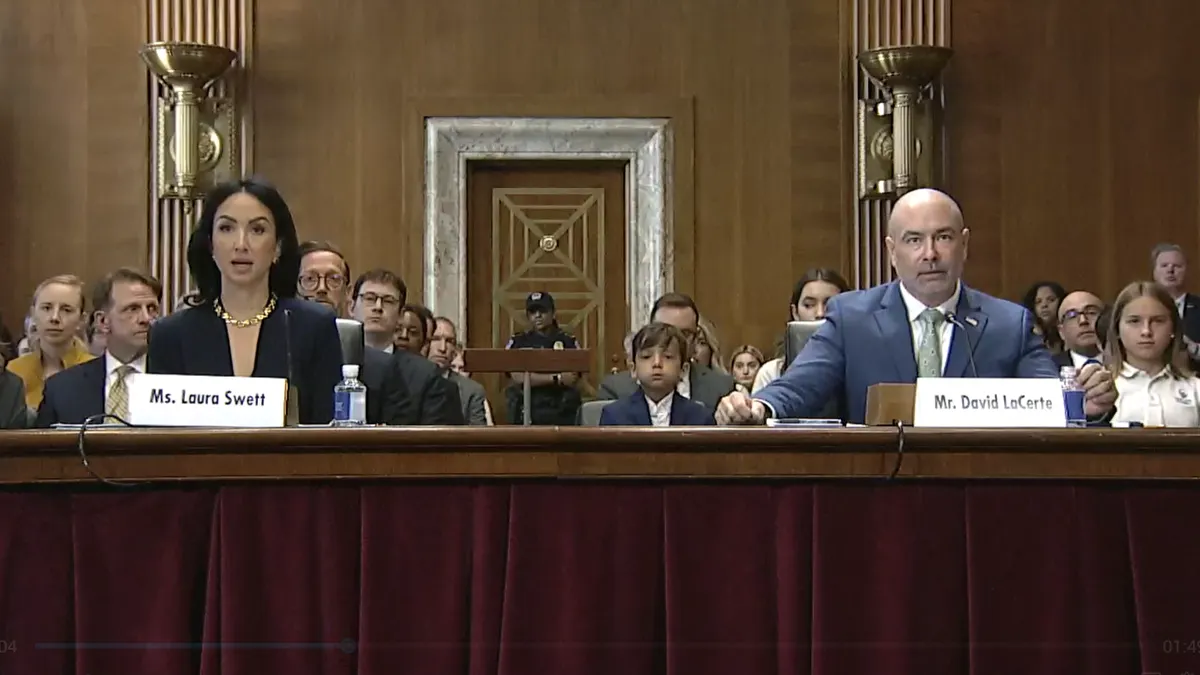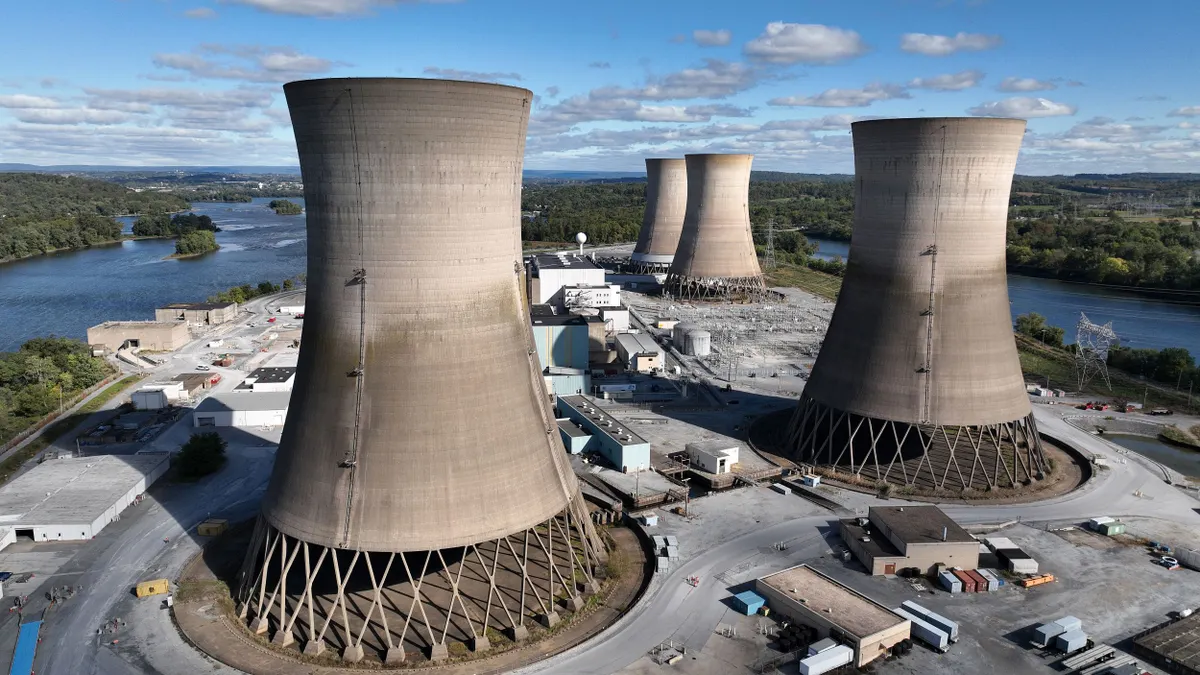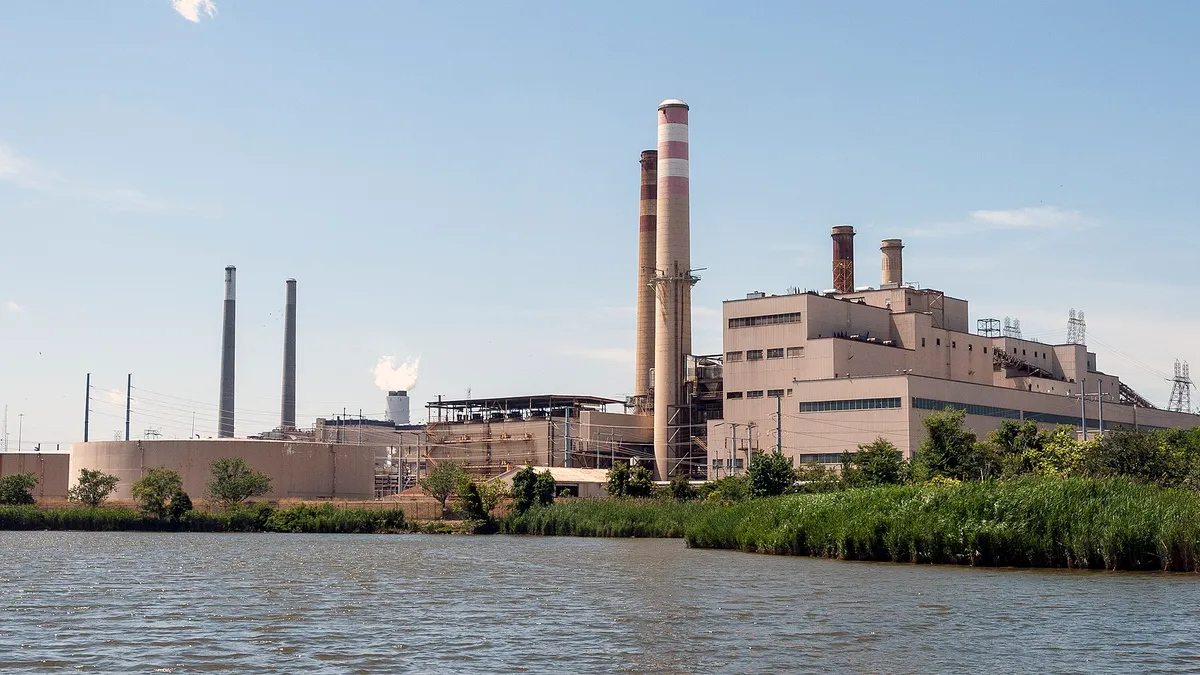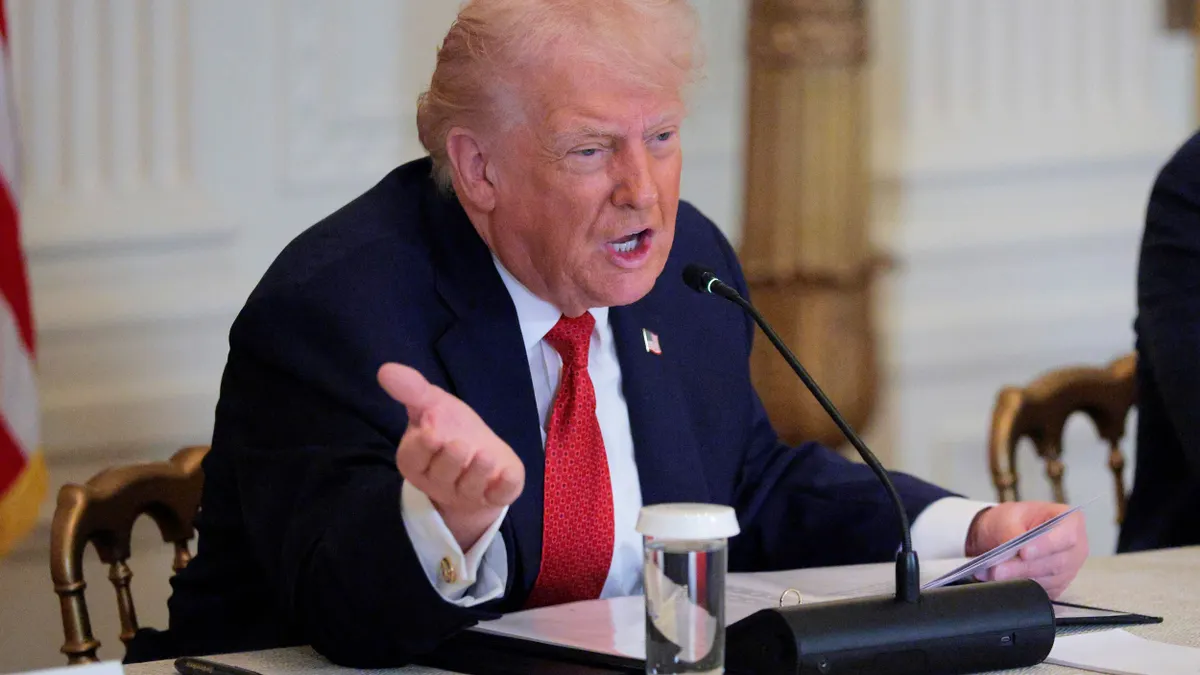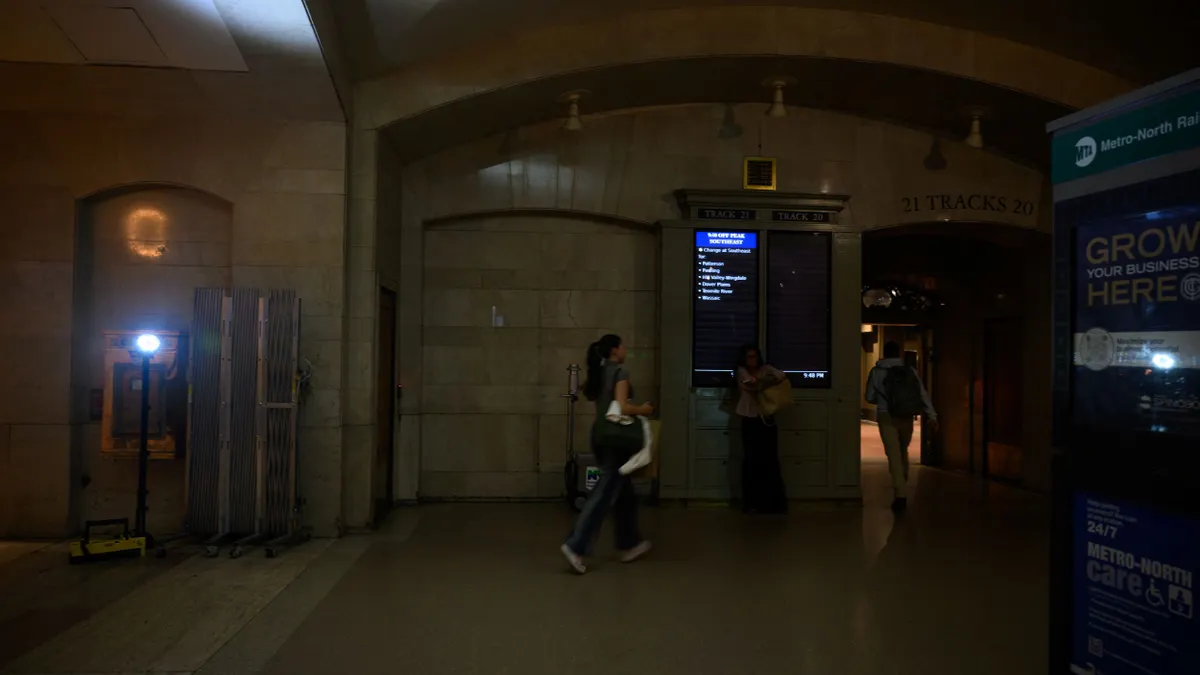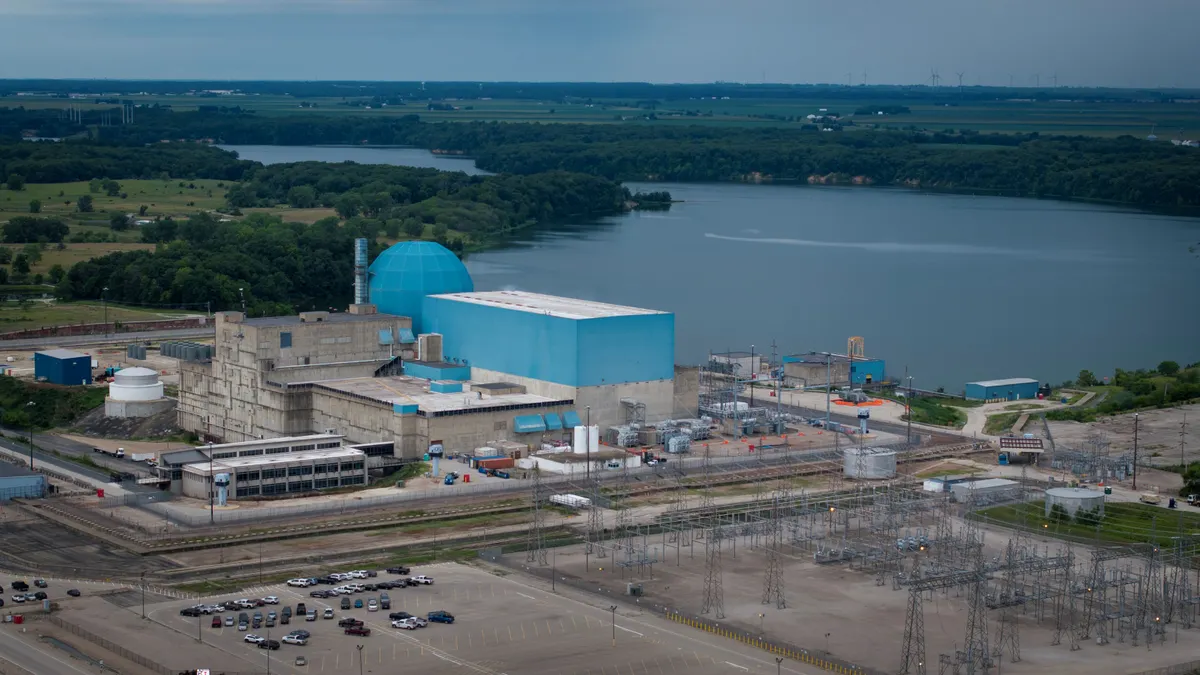Laura Swett and David LaCerte — President Donald Trump’s nominees to become commissioners at the Federal Energy Regulatory Commission — told senators Thursday that if confirmed, they would uphold the agency’s independence while remaining neutral toward generating technologies.
The Republican nominees to fill two vacant seats on the five-member commission, which oversees parts of the power, natural gas, oil and hydroelectric sectors, were speaking at a confirmation hearing before the Senate Energy and Natural Resources Committee.
Swett is an energy attorney at Vinson & Elkins and former FERC staffer. She worked in FERC’s enforcement office and as an advisor to former Commissioner Bernard McNamee and former Chairman Kevin McIntyre.
LaCerte is an official in the U.S. Office of Personnel Management. Previously, he was acting managing director at the U.S. Chemical Safety and Hazard Investigation Board and a special counsel at the Baker Botts law firm for two years, starting in January 2023, working mainly on Clean Air Act-related litigation, he told the Senate panel.
“The most important qualification I have is that I can bring a common-sense approach to get problems solved and get things done,” LaCerte said.
LaCerte is also listed as a contributor to Project 2025, the conservative blueprint for dismantling the administrative state published by the Heritage Foundation.
Next, the Senate committee will vote on the nominees, who must also be approved by the full Senate before they can be seated at FERC. A Senate vote could come next month, but negotiations over appropriations and the possibility of a continuing resolution could delay action on the nominees, research firm ClearView Energy Partners said in a client note on Thursday.
The nominations come amid concerns about rising demand for power, ongoing reductions in FERC staffing, as well as the potential for the Trump administration to limit FERC’s independence.
LaCerte said he does not expect the Trump administration to order mandatory staff cuts at FERC.
“The mission of FERC is directly in line with the president's management agenda, and I don't foresee anyone asking that of FERC,” he said. The agency is under a hiring freeze, however, and former FERC Chairman Mark Christie said earlier this year it faces a roughly 9% cut in staff through voluntary attrition.
Key priorities include affordability, reliability amid rising demand
Swett said she had three top priorities if she is confirmed as a FERC commissioner: keeping energy costs down while maintaining reliability; facilitating the connection of new large loads like artificial intelligence data centers, which she cast as a matter of national and economic security; and facilitating power infrastructure development.
“This development has faced crippling regulatory uncertainty over the recent past, and it's well-functioning and increase is critical to reliability, safety and our economy,” Swett said. “I actually have lost sleep a few nights worrying about how our country will meet the demand that it faces.”
For his part, LaCerte said reliability and affordability are a “bedrock” of FERC’s work.
“If confirmed … we'd ask two questions of every single action which we undertake at FERC as commissioner: ‘How does this make our grid and energy structure more reliable?’ And the second question we'd ask is, ‘Does this make our grid and infrastructure more affordable?’ And if the answer to those questions is no, then ask why we're doing it,” LaCerte said.
Demand growth is adding to the challenges FERC is facing, according to LaCerte.
“Artificial intelligence, data centers and reindustrialization present a compounding of these issues, which will require diligent planning, forecasting and regulatory oversight from both the states as well as FERC,” he said.
The administrative burden placed on infrastructure developers is “staggering,” according to LaCerte.
“Delays in federal reviews and decision-making make energy less reliable and more expensive,” he said. “Reducing processing time and the associated administrative burden will speed projects along, allowing those cost savings to be passed to ratepayers.”
Concerns over agency independence
The nominees faced pointed questions from some senators over preserving FERC’s independence as Trump has asserted unprecedented control over other independent bodies like the Federal Reserve and the Nuclear Regulatory Commission.
“Destroying the independence of the Federal Energy Regulatory Commission would do irreparable damage to public confidence in the commission's decision making, to regulatory stability and to our energy security,” said Sen. Martin Heinrich, D-N.M., the committee’s ranking member.
Swett and LaCerte both said they support FERC’s status as an independent agency.
“Maintaining FERC independence is critical because that is exactly how Congress created the agency in the [Department of Energy] Organization Act of 1978,” Swett said. “Congress carved FERC out of DOE's jurisdiction and explicitly provides that no FERC action is under review by anyone at DOE.”
LaCerte expressed a similar view.
“I'll do the most of my ability under the law to maintain the independence of FERC, 100%,” he said.
Markets and fuel neutrality
As the Trump administration has sought to stop the development of renewable energy, particularly wind projects, Swett said FERC cannot discriminate against any type of generation.
LaCerte echoed Swett’s comments.
“The Federal Power Act requires that commissioners be neutral in those decisions,” he said. “We're going to need more reliable base load power moving forward, and coal certainly pays an important component in that mix.”
In response to a question about hydropower, Swett said, “Given our unprecedented demand that we're facing, getting every single molecule of electricity on the grid is of tantamount importance.”
Partly driven by rising demand, every wholesale power market is struggling with resource adequacy issues while also trying to respect state energy policies, according to Swett.
“So the best thing that FERC can do is take all of the inputs that it gets from those states and their generation choices, and every generator before it and the rates that it is considering, to ensure that just and reasonable rates are achieved for the American people under the Federal Power Act,” Swett said.
Transmission and grid-enhancing technologies
The nominees also addressed concerns over transmission and grid infrastructure.
“We need more transmission — that's beyond debate,” LaCerte said. “Transmission is going to be part and parcel to maintaining that [demand] growth and sustaining that growth over the long term, but it's important to note also we need to do so while protecting the ratepayers.”
LaCerte said he also remains open to grid-enhancing technologies that can make existing transmission infrastructure more efficient.
“I fully support a continued analysis and a continued encouragement of their usage as we continue to evolve in these areas and we continue to find new and innovative ways to deliver electricity,” LaCerte said.
Swett said the U.S. “should be maximizing the resources that we already have, including the existing grid.”



